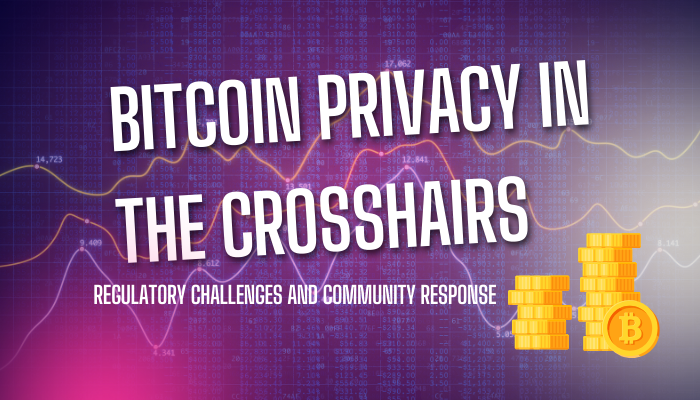The Growing Battle for Bitcoin Privacy: A Critical Moment for “Freedom Money”
Bitcoin has transitioned from a niche digital currency to a globally recognized financial asset, championing decentralization and financial sovereignty. However, its rise has attracted significant regulatory scrutiny, threatening one of its core principles: privacy.
The Regulatory Onslaught
Governments worldwide are increasingly aware of Bitcoin’s potential to disrupt traditional financial systems and are imposing stricter regulations. A major focus is enhancing transparency to combat illicit activities like money laundering and terrorism financing. For example, the U.S. Financial Crimes Enforcement Network (FinCEN) has proposed stricter reporting requirements for transactions involving privacy-enhancing tools, such as cryptocurrency mixers. While these tools are associated with illicit activities, they also offer legitimate privacy protection. The proposed regulations could infringe on the privacy of lawful users and discourage the use of these essential tools.
The Community’s Response
The Bitcoin community, a strong advocate for financial freedom, has vigorously opposed these regulatory measures. Developers, businesses, and advocacy groups, such as Samourai Wallet and the Blockchain Association, have criticized these proposals for stifling innovation and infringing on privacy. They argue that combating illicit activities should not come at the expense of individual privacy rights and warn that excessive regulation could hinder technological advancement.
Privacy as a Fundamental Right
The debate over Bitcoin privacy raises a critical question: Should financial privacy be considered a fundamental human right? Traditional financial systems protect customer information, but Bitcoin operates outside these frameworks, placing the burden of privacy on individual users. Advocates argue that cryptocurrencies deserve the same privacy protections as traditional financial transactions. Without robust privacy measures, Bitcoin’s role as “freedom money” — a currency free from government surveillance — is at risk, potentially undermining its appeal and core value proposition.
Developers on the Frontlines
Bitcoin developers are working to enhance privacy features in response to increasing regulatory pressures. Innovations like CoinJoin and Taproot aim to improve transaction privacy and traceability. However, developers face legal and regulatory challenges and fear that criminalizing privacy-enhancing technologies might deter further innovation. Protecting privacy while fostering technological progress is a delicate balance in the ongoing fight for Bitcoin’s privacy.
Global Implications and the Road Ahead
The battle for Bitcoin privacy extends beyond the U.S., with global regulatory bodies grappling with cryptocurrency regulations. Stricter regulations in some countries may drive users and businesses to jurisdictions with more favorable conditions, potentially leading to regulatory arbitrage and market fragmentation. The future of Bitcoin as “freedom money” hinges on navigating these challenges while upholding the principles of decentralization and financial sovereignty.
In conclusion, the fight for Bitcoin privacy is at a critical juncture. As regulatory pressures increase, the cryptocurrency community must defend the privacy and freedom that Bitcoin was designed to uphold. The outcome of this struggle will significantly impact the future of digital currency.
